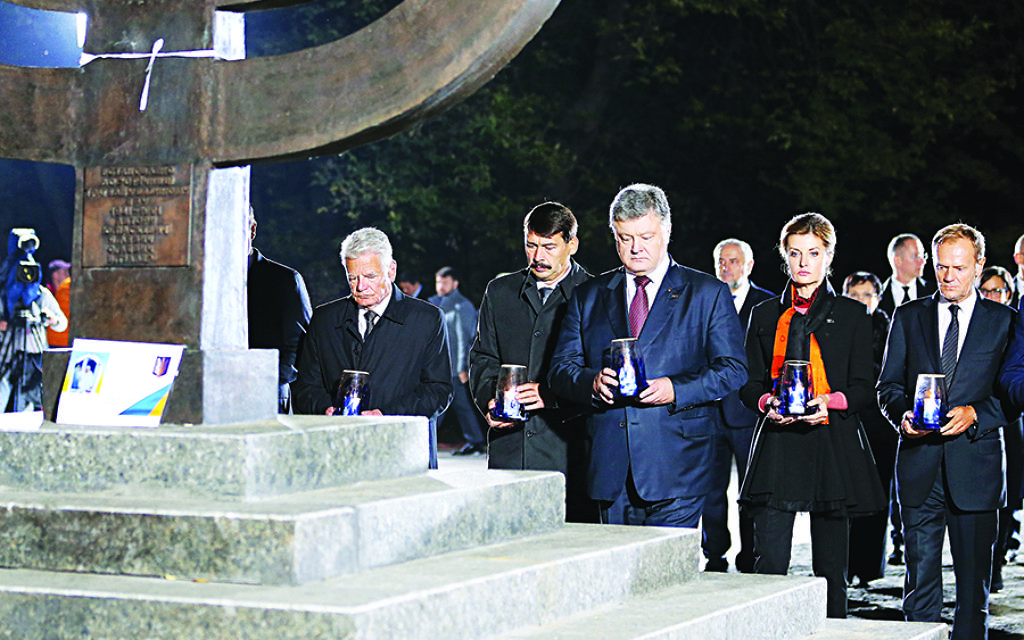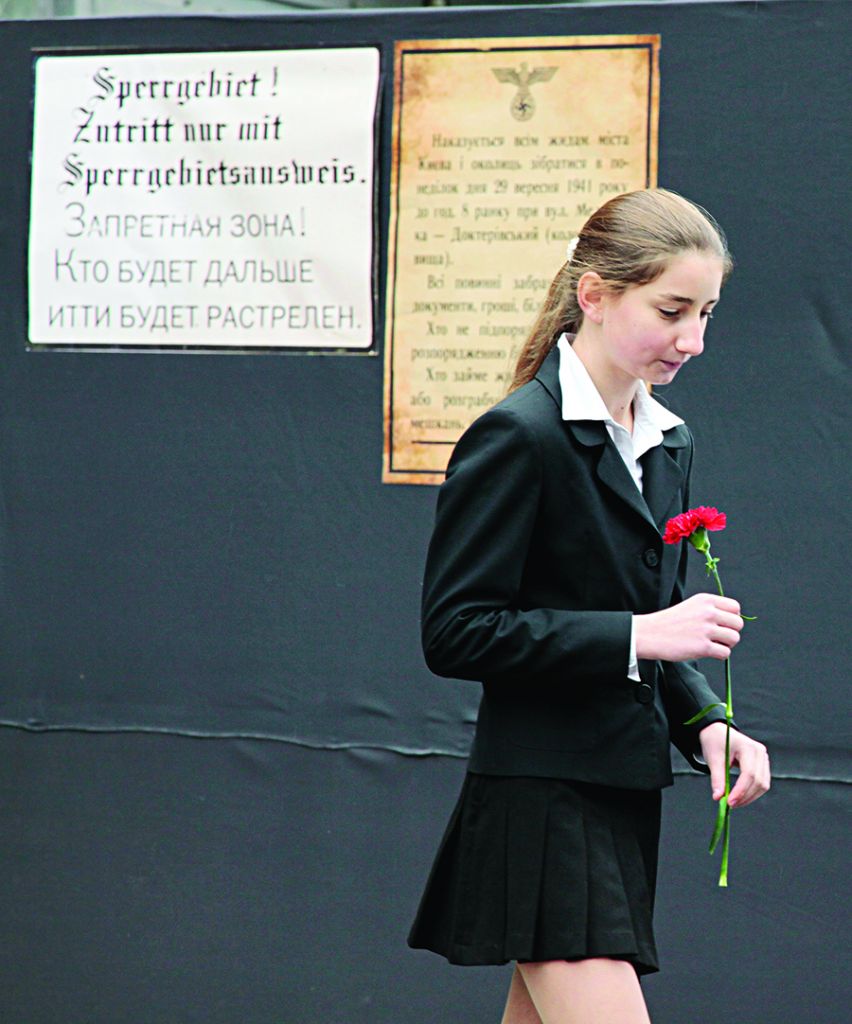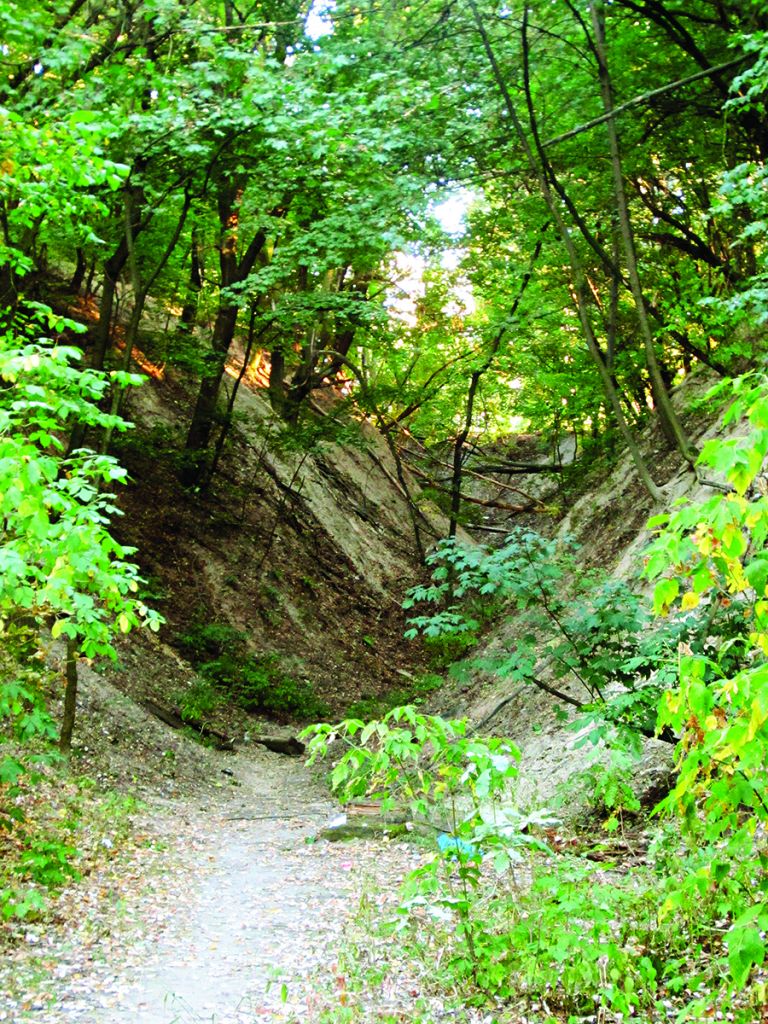Babi Yar: The Holocaust of the bullets
Jenni Frazer visits the site of the Babi Yar massacre to mark its 75th anniversary

Each one had a name, each with a face, each with a story”. The agonising story of Babi Yar, in which more than 33,000 Jews were murdered and thrown into a ravine outside Kiev, Ukraine, was revisited last week in ceremonies at the site to mark the 75th anniversary of the massacre.
But the anniversary event — with heavyweight contributions from Ukrainian president Petro Poroshenko, German president Joachim Gauck, US commerce secretary Penny Pritzker, European Council president Donald Tusk and the French-Jewish philosopher Bernard-Jenni Levi — was not without controversy.
Together with the World Jewish Congress, and at the initiative of the mayor of Kiev, former heavyweight boxer Vitaly Klitschko, the Ukraine government has given its blessing to an ambitious plan to create a Holocaust Memorial Centre at Babi Yar, funded initially by private donations from a group of Ukrainian oligarchs.
Get The Jewish News Daily Edition by email and never miss our top stories Free Sign Up
But Rabbi Yaakov Dov Bleich, chief rabbi of Kiev and Ukraine, and Jewish Agency chairman Natan Sharansky were challenged at the launch press conference on Thursday morning as it emerged that hard-line Ukrainian nationalists had posted extremist messages on social media, following a presentation in the Ukrainian parliament by Israel president Reuben Rivlin earlier in the week.
Rivlin, who cut short his visit to Ukraine to fly back for the funeral of Shimon Peres, gave a robust speech in which he warned: “We must not play a part in the sin of forgetting or denial.”

He added: “National leaders who support anti-Semitic, racist, or neo-Nazi ideas will not be welcomed as friends among the family of nations.”
This is the central problem of modern Ukraine, fighting against Russian president Putin in the east and trying to re-invent itself in a bid to make friends in the West and improve its trading position in Europe. But at the same time there is great discomfort in the land over those Ukrainians who collaborated with the Nazis and made it possible for the Einsatzgruppen to carry out what is called “the Holocaust of the Bullets”.
Rabbi Bleich told Jewish News: “It’s very important to understand the challenge facing Ukraine today. Children here — and that include
s Jewish children — have had until now no possibility of learning their own history.”
For years, the Soviet Union demanded that Babi Yar was effectively covered up and even today there is an insistence that those who died there were simply Ukrainian citizens — which they were — rather than having been killed because they were Jews.
For their part, many Ukrainian nationalists believe Soviet oppression was a direct result of the role played by Communist Jews.
One of the harshest critics of the direction of the proposed Holocaust Memorial Centre for the victims of Babi Yar is Vladimir Vyatrovich, director of Ukraine’s Institute for National Memory. He is angry that Ukrainian nationalists are painted primarily as collaborators with the Germans, and frequently cites a case of a member of the local policeman in Kiev who saved a Jewish boy and was himself shot by the Germans.
It may well be true, but it is probably the only case of its kind; far more prevalent, as World Jewish Congress director Robert Singer explained in a tough address at Thursday night’s memorial ceremony, were “those who looked the other way. Too many ordinary people watched as their Jewish neighbours were taken away and pretended that they didn’t see. Since World War II, Germany has taken responsibility for its crimes. Since 1945, it is hard to find a more responsible country than Germany. And it is long past time that all countries involved, not just Ukraine, take responsibility for their actions during that dark time”. Meanwhile, Vyatrovich has been appointed by the Ukrainian government to serve with the coalition putting together the Holocaust Memorial Centre, so many rows lie ahead.

Speaking at the launch of the centre, Natan Sharansky recalled the repeated attempts by the Soviet Union to erase the memory of Babi Yar. He said: “I was born in Stalino, later called Donetsk. I spent my entire childhood in the region of Stalino, Make’evka, Gorlovka, Artemovsk – places where dozens of thousands of Jews were killed just a few years before my birth. Thousands of people were thrown to die in the abandoned mine near which we used to play as kids. In Artemovsk, thousands were walled up alive in the mine tunnels. And we lived near these places, played there a game of Red and White army – fascists against Red Army soldiers. We knew nothing about this. Later, in the 70s and 80s, we were often arrested and spent several hours in preventive detention on September 29, so that we would not be able to go to Babi Yar on that day. Those were the efforts of the Soviet government to wipe this day from our memory”.
Sharansky paid tribute to Klitschko, the Kiev mayor, and the Jewish philanthropists who have funded the project, for the initiative, saying: “They are totally right in their decision that for the bright future of the relations between our nations and to prevent such tragedies in the future, this centre is extremely important, not only as a memorial and scientific and educational centre, but as a basis for our new co-operation for a better world.”
Amid all the ceremonial glitz and the smooth speeches, it was sometimes hard to remember the thousands of Jews murdered in two long and bloody days in September 1941.
But Penny Pritzker, the US secretary of commerce, had a personal stake in Babi Yar. One hundred and thirty-five years ago, she said, her then 10-year-old great grandfather had fled Ukraine with his family for America. And had he not, she said, “my family’s remains might be in this ravine, too”.
And as it happens, my grandfather left Kiev at around the same time.
And through it all, I could not help wondering whether any of my extended family had ended their lives at Babi Yar, each one, as Pritzker said, with a name, a face, and a story.
I will never know.

Thank you for helping to make Jewish News the leading source of news and opinion for the UK Jewish community. Today we're asking for your invaluable help to continue putting our community first in everything we do.
For as little as £5 a month you can help sustain the vital work we do in celebrating and standing up for Jewish life in Britain.
Jewish News holds our community together and keeps us connected. Like a synagogue, it’s where people turn to feel part of something bigger. It also proudly shows the rest of Britain the vibrancy and rich culture of modern Jewish life.
You can make a quick and easy one-off or monthly contribution of £5, £10, £20 or any other sum you’re comfortable with.
100% of your donation will help us continue celebrating our community, in all its dynamic diversity...
Engaging
Being a community platform means so much more than producing a newspaper and website. One of our proudest roles is media partnering with our invaluable charities to amplify the outstanding work they do to help us all.
Celebrating
There’s no shortage of oys in the world but Jewish News takes every opportunity to celebrate the joys too, through projects like Night of Heroes, 40 Under 40 and other compelling countdowns that make the community kvell with pride.
Pioneering
In the first collaboration between media outlets from different faiths, Jewish News worked with British Muslim TV and Church Times to produce a list of young activists leading the way on interfaith understanding.
Campaigning
Royal Mail issued a stamp honouring Holocaust hero Sir Nicholas Winton after a Jewish News campaign attracted more than 100,000 backers. Jewish Newsalso produces special editions of the paper highlighting pressing issues including mental health and Holocaust remembrance.
Easy access
In an age when news is readily accessible, Jewish News provides high-quality content free online and offline, removing any financial barriers to connecting people.
Voice of our community to wider society
The Jewish News team regularly appears on TV, radio and on the pages of the national press to comment on stories about the Jewish community. Easy access to the paper on the streets of London also means Jewish News provides an invaluable window into the community for the country at large.
We hope you agree all this is worth preserving.
-
By Laurent Vaughan - Senior Associate (Bishop & Sewell Solicitors)
-
By Laurent Vaughan - Senior Associate (Bishop & Sewell Solicitors)
-
By Laurent Vaughan - Senior Associate (Bishop & Sewell Solicitors)
-
By Laurent Vaughan - Senior Associate (Bishop & Sewell Solicitors)





















